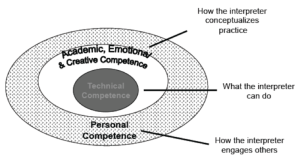Interpreter Perspectives & Relational Autonomy
Vocational Rehabilitation: History, System & Process
An infusion module for Interpreter Education Programs
This section features interpreters from the Massachusetts Rehabilitation Commission who work with VR consumers and professionals. There is also information provided on the topic of Relational Autonomy to provide a theoretical framework.
Interpreter Perspectives on Working in VR Settings:
This video share some insights in American Sign Language from interpreters about why they enjoy working in vocational rehabilitation settings.
Interpreter Perspectives on Working in VR Settings:
This video share some insights in American Sign Language from interpreters about why they enjoy working in vocational rehabilitation settings.
English Transcript
Interpreter 1:
I think in this country we are entitled to, we have the rights of life, liberty and the pursuit of happiness. Part of that pursuit of happiness is the ability to determine what you are going to do in the world and how you are going to contribute to society. And part of that contribution is the kind of work that we do and in life. And so it’s all self-determination. And the work that I do contributes to an individual’s ability to secure those rights. That’s a noble thing for me. And so it allows them to provide for their family, to have a home. And that’s what kind of part of being a human being is and that’s why I do it.
Interpreter 2:
It’s been an interesting experience because I get to learn about job-seeking skills and how to present your self for a job. As well as going into different job training and so forth that I would never do in my lifetime because I don’t like don’t like computers or I don’t like science. So I get to go into different realms and learn more stuff. And I tend to remember what I interpret for the most part. So I’ll get that knowledge put in the back of my head for later. And I’ll be like “oh how did I learn that?”. So the variety is really fun and the group I work with is cool, too.
Interpreter 3:
I just work with a great group of people, the variety and the challenge. Um, I think that one really important part for me is seeing deaf consumers coming in and maybe not having a lot of work experience. They get guidance from an RCD, a counselor for the deaf, who guides them in a way that leads them to school or to training or whatever or just even a job. Gets them out into the work environment. And it’s empowering to see people go from a place of not knowing where they want to go in life to finding that place and following that path and becoming contributing members of society. We all want to do that and it’s great to see folks get that guidance from the counselors I work with.
Relational Autonomy in VR Settings
It is important to note that out of their experiences, it is clear that interpreters need to understand more about VR settings than just the language that is used there. They must also understand the larger context to the work of the VR system and how that connects to American values related to work and meaning.
To have a clearer approach to interpreting in VR settings, the concept of “relational autonomy” as introduced by Anna Witter-Merithew, Brenda Nicodemus, and Leilani Johnson, can be particularly helpful. Relational autonomy refers to the ability to make decisions and act upon them that interpreters have, but characterizes that decision-making ability as being relational. That is, our decision latitude depends on our relationship with the others involved in an interaction. To be effective, interpreters need to know more than just now to interpret between two languages, but also to understand how the practice of interpreting fits within the different systems they encounter. (In this case, that means the vocational rehabilitation system, but it is transferrable to other settings.) Finally, an interpreter must understand how to engage with other people within those contexts – whatever language those people speak or whatever cultural experience they come out of.
Anna Witter-Merithew developed this graphic to help explain those different competences.

(Click on the image to see a larger version.)
The interpreters who reflected in the videos shared some examples of competencies that would fit into these different categories. As you move forward through this process, please keep this broader framework in mind as you try to develop all of the required competencies.
Article on Relational Autonomy
Witter-Merithew, Nicodemus, and Johnson. 2010. “Relational Autonomy and Decision-Latitude of ASL-English Interpreters: Implications for Interpreter Education,” in Roberson and Shaw, Connecting our World: Expanding Our Horizons: The Proceedings of the 18th National Convention of the Conference of Interpreter Trainers. www.cit-asl.org.
Copyright © 2013-2016 by the National Consortium of Interpreter Education Centers (NCIEC).
This NCIEC product was developed by the National Interpreter Education Center (NIEC) at Northeastern University. Permission is granted to copy and disseminate these materials, in whole or in part, for educational, non-commercial purposes, provided that NCIEC is credited as the source and referenced appropriately on any such copies.
